Here is the list of December Global Holidays & Festivals. We have also mentioned all the important observances and festivals across the globe in December month. Not all of the December global festivities are holidays.
| December 1st | World’s AIDS Day |
| December 5th | Krampusnacht |
| December 8th | Bodhi Day |
| December 8th | Immaculate Conception |
| December 10th | Human Rights Day |
| December 13th | Saint Lucy’s Day |
| December 16th – 24th | Las Posadas |
| December 20th | International Human Solidarity Day |
| December 18th – 26th | Hanukkah |
| December 21st | Winter Solstice or Yule |
| December 24th | Christmas Eve |
| December 25th | Christmas |
| December 26th | Boxing Day |
| December 26th | St. Stephen’s Day |
| December 26th – January 1st | Kwanzaa |
| December 31st | New Year’s Eve |

World’s AIDS Day – December 1st
World’s AIDS Day is an international day designated on December 1st, which focuses on raising awareness of the AIDS pandemic. The widespread HIV infection caused the pandemic. The day is also dedicated to mourning those who have died from the disease and supporting those who have the disease right now.
Is World Aids Day A Public Holiday?
World AIDS Day is a global observance but not a public holiday in most countries including USA, UK, India & all European countries.
World’s AIDS Day takes place on December 1st each year, and it is a chance for people around the world to support and unite in the fight against HIV. During this day, there is a lot of awareness raised about HIV/AIDS, which demonstrates international unity against the fight.
The World Health Organization announces a theme for World’s AIDS Day to commemorate it every year. They also hold conferences each year to spread awareness of the pandemic.
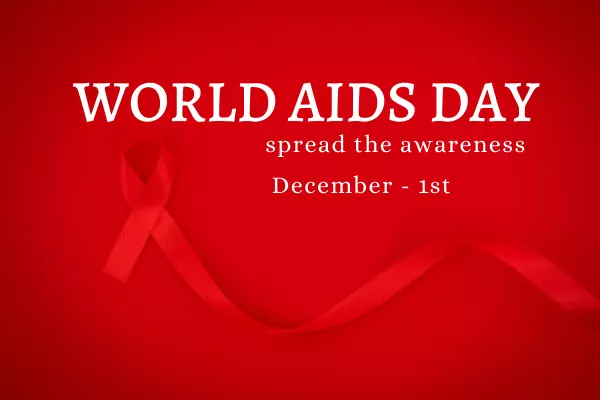
When Did World’s AIDS Day Start?
World AIDS Day started in 1988 and was created by the World Health Organization. All UN member states observe it. It was the first international day for global health ever founded. It was established to create a day where the exchange of information among national governments, international organizations, and individuals could be easily facilitated.
Every year on December 1st, governments, civil societies, and United Nations agencies partner together to campaign based on the specific theme for the year. Different activities take place around the world on this day.
Why and How Do We Celebrate World’s AIDS Day?
We celebrate World’s AIDS Day to come together in the fight against the disease, help those living with the disease, and remember those who have died from AIDS and AIDS-related illnesses.
There are different ways to celebrate World’s AIDS Day, including joining conferences, taking HIV tests, sharing stories, attending events, participating in marches and rallies, and holding memorials. There are also discussions and debates to spread awareness. The main symbol of World’s AIDS Day is the red ribbon, so the simplest way to show support is by tying a red ribbon.
Krampusnacht – December 5th
Krampusnacht is a celebration dating back hundreds of years ago when it was widely celebrated in Germany, Bavaria, Austria, Eastern Europe and Central Europe. In recent years, Krampusnacht become a popular holiday in the United States. It is well celebrated in places like Seattle, Philadelphia, and New Orleans.
Krampusnacht is also called Krampus Night based on traditional narratives and folklore. It was suppressed for a long time and even forbidden at certain times during its history, but the interest in the celebration and the character is Krampus. Krampusnacht is the first December Global holiday.
What is Krampusnacht?
Krampusnacht is a celebration originating from folklore from the Alpine nations, dating back centuries away. It is celebrated on December 5th and dedicated to a creature, which is a half-demon and half-goat. The beast is called the Krampus.
Those who celebrate Krampusnacht are usually adults who seek to punish misbehaving children. It’s historically not a cheery holiday, but it is now connected to a lot of joy and merriment as it evolves. Interest in Krampusnacht and the Krampus character has grown in the past century.
Now, you can celebrate the holiday in Germany, especially in Bavaria. Other countries include Austria, Slovenia, the Czech Republic, and Hungary. Nowadays, the popularity of the holiday has grown in the United States.
What Are the Traditions of Krampusnacht?
Krampusnacht is a pagan holiday, and it can be celebrated in different ways. The essential tradition is that people put plates on their tables and go to bed. The next day, they are expected to see presents on the plates if they are good but sticks if they’ve been bad.
Nowadays, Krampusnacht is celebrated with traditional parades in which young people dress as Krampus and try to scare the audience. Those who don’t want to wear the Krampus costume can also dress as angels and elves. Women also dress like Frau Perchta, which is a popular Nordic figure.
People also hold Krampusnacht parties, watch the Krampus movie, and send Krampus cards. There is also the Krampus Run, which involves people dressed as Krampus running through the streets.
When Was Krampusnacht First Celebrated?
Krampusnacht has observed hundreds of years ago in Germany and spread across Europe. The celebration was prohibited for many years, first by the Catholic Church and then during the Second World War by European fascists.
The folklore states that on December 5th, Krampus gives sticks to those who have been bad and presents to those who are good. Some historical contexts also say that the monster beat the children with sticks or took them to hell.
Krampus is compared to St. Nicholas, who gives gifts on December 6th, and Santa Claus, which is associated with Christmas. They are all associated with gift-giving.
Bodhi Day – December 8th
Bodhi Day is a Buddhist holiday that takes place on December 8th. Bodhi Day celebrates and remembers the day that Gautama Buddha is reported to have experienced enlightenment. Bodhi Day is celebrated quietly and calmly, with meditation and prayer.
Bodhi Day is not a December global holiday in the USA, UK, Europe, or English-speaking countries. Bodhi day is not a recognized holiday even in Japan and India, where Bodhi Day is celebrated among some communities.
What is Bodhi Day?
Bodhi Day commemorates the day that Gautama Buddha, also called Shakyamuni, experienced enlightenment. Based on tradition, Siddhartha foresaw years of profound ascetic practices and decided to peepal trees, also known as the Bodhi tree hence the name.
He meditated under the tree until he discovered the root of suffering and how to be free from it. Enlightenment and awakening are also called Bodhi in Pali and Sanskrit. Although Bodhi Day is celebrated on different days worldwide, the international celebration is done on December 8th.
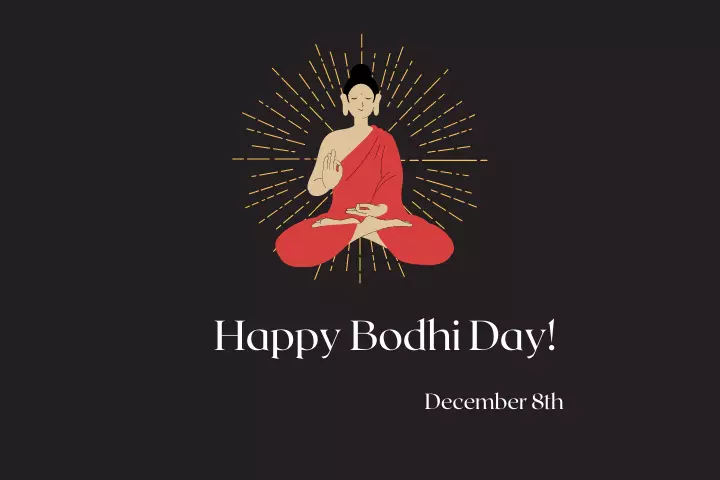
Who Celebrates Bodhi Day?
Bodhi Day is celebrated by the Buddhists who follow Gautama Buddha, also called Shakyamuni Buddha or Siddhartha Gautama. They celebrate the day that he became Buddha.
Bodhi Day is best commemorated in Buddhist countries, including those in mainstream Mahayana traditions. Also, traditional Pure Land and Zen schools in Korea, Vietnam, China, the Philippines, and Japan.
How Is Bodhi Day Celebrated?
Bodhi Day is celebrated quietly, as Buddhists usually spend the day meditating and praying. They ponder about the Four Noble Truths and the Noble Eightfold Path. Those celebrating at home can put up a small Bodhi tree with lights and statues of Buddha around the world.
The white or multicolored lights are meant to show the path to enlightenment. The lights will be left on for 30 days after December 8th. A candle can also be lit to celebrate enlightenment. As for greetings, there is no traditional greeting, but it’s usually acceptable to say ‘Happy Bodhi Day’ or ‘Blessed Bodhi Day.’
As for food, it is significant to have a meal of rice and milk, which is said to have been the first meal offered to Buddha so he can regain his strength.
Feast of the Immaculate Conception – December 8th
The Feast of the Immaculate Conception is celebrated on December 8th, and this is nine months before the Nativity of Mary feast, which is commemorated on September 8th. It is also called the Solemnity of the Immaculate Conception or Immaculate Conception Day. The significance of the celebration is the pure and sinless Conception of the Blessed Virgin Mary.
Feast of the Immaculate Conception is not a public holiday but an observance.
What is the Feast of the Immaculate Conception?
The Feast of the Immaculate Conception is a Catholic holiday and feast on December 8th, celebrating the day Mary was conceived in the womb of her mother, who is reportedly St. Anne. This is why the Feast of the Nativity of Mary is observed nine months after.
Based on the dogma of this holiday, Mary was kept free from any original sin when she was conceived because of God’s grace and the good things Jesus, who is her son, will later achieve. Based on this dogma, it is said that Mary’s freedom of sin was what qualified her to give birth to Jesus without infecting him. It is also based on this that Mary is the mother of the Roman Catholic Church.
Who Celebrates the Feast of the Immaculate Conception?
The Solemnity of the Immaculate Conception is celebrated by the Roman Catholic Church and some particular Protestant church factions. The Catholics believe that God bestowed the Immaculate Conception on Mary so that she could provide a spotless and sinless nature for Jesus.
Protestants largely reject this concept because only a few bible verses support the Marian dogma, including the Immaculate Conception.
How is the Feast of the Immaculate Conception Celebrated?
The main celebration of this holiday is the Catholic feast, as in the name. Catholics usually cook dinner in their homes, with fried foods and dessert in plenty.
But aside from this, there are other practices done on this day. These include going to Mass, lighting Mary candles, saying a Marian prayer, and eating something white.
Human Rights Day – December 10th
Human Rights Day is observed annually on December 10th, adopted first by the United Nations General Assembly. It is the international day dedicated to protecting and awareness of human rights. Although Human Rights Day can differ from country to country, this is the international day of celebration.
What is Human Rights Day?
Human Rights Day is a day chosen to celebrate human rights. The date was determined because of the adoption and proclamation of the Universal Declaration of Human Rights by the United Nations General Assembly. It commemorates this day every year, around the world.
The holiday is observed by the international community every year. We celebrate Human Rights Day to show that the world needs to continue working towards that everyone has the same human rights, from food and shelter to speech and equality. Not many people know that this is an international day of celebration, so awareness is also made on this day.
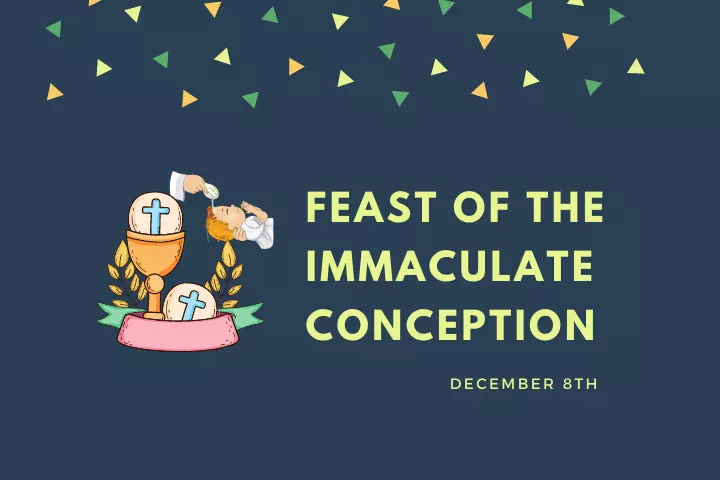
What is the History Behind Human Rights Day?
Human Right Day is meant to commemorate December 10th, 1948, when the UN General Assembly adopted the UDHR. This ensured every human being had their inalienable right protected, despite their gender, religion, nationality, race, and sex.
Since then, December 10th has remained Human Rights day to remind everyone of their rights and those they might violate. The UDHR is available in over 500 languages and is reportedly the most translated document globally. Every year, Human Rights Day has a theme given by the UN.
How to Celebrate Human Rights Day?
There are different ways to celebrate Human Rights Day, but it is mostly about raising awareness. Thus, there are parties, marches, parades, talent shows, and vigils to celebrate our rights and also remember those who had their rights abused and violated.
Celebrators can also participate in certain peace or charity projects held on this day, raise awareness about the UDHR, or organize a party.
Saint Lucy’s Day – December 13th
Saint Lucy’s Day is also called the Feast of Saint Lucy. It is a Christmas feast that is celebrated on December 13th. It is meant to celebrate Saint Lucia, an early 4th-century German martyr. There is a small island in the Caribbean called Saint Lucia, named after its patron saint.
What is Saint Lucy’s Day?
Saint Lucy’s Day is a festival of lights meant to celebrate one of the earlier Christian martyrs, St. Lucia or St. Lucy. The date, December 13th, was based on the Julian Calendar in the 14th century. But, when the world changed its calendar from Julian to a Gregorian system, the holiday remained on December 13th rather than being moved to the 21st.
Saint Lucy’s Day is not a public holiday in the USA & UK but in most parts of the world, December 13th is a holiday as a part of the Winter holidays.
Before the calendar reforms, Saint Lucy’s Day coincided with the year’s shortest day. It is also widely celebrated as the festival of lights. It is also seen as the antecedent of Christmastide because it is celebrated before Christmas day.
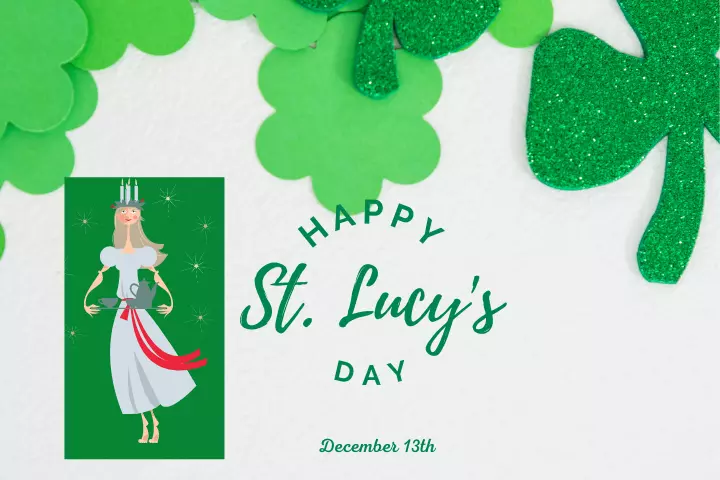
Who Celebrates Saint Lucy’s Day?
Saint Lucy’s Day is celebrated by Roman Catholics, Lutherans, Anglicans, and some Christians. The holiday is primarily celebrated in Sweden, Norway, Finland, and other Scandinavian countries. In Scandinavia, St Lucy is called Santa Lucia. The color of the holiday is red.
Saint Lucy is represented as a woman in a white dress with a red sash, representing the baptismal robe and the blood of her martyrdom. She also has a wreath on her head. In these countries, it is celebrated with songs and girls dressing like the saint. The boys will wear costumes of Saint Stephen and Santa Claus. The purpose of the celebration is to give enough light to live during the winter.
When and Why Did Saint Lucy’s Day Start?
Saint Lucy Day started in the Church in the 6th century to remember the death of the virgin martyr. Her death was on December 13th, 304 AD. Saint Lucy is the patron saint of the blind because when her body was being prepared for burial, it was discovered that her eyesight had been restored.
Her eyes were gouged, and a spear was put through her throat to make her denounce Christianity, but she refused. She was still alive until she was given the Christian Last Rites.
Families can celebrate Saint Lucy’s day by having the eldest daughter or woman wear a white dress and red sash, and serve baked goods and coffee to other family members and their visitors. These baked goods include ginger biscuits and Lussekatter. Celebrators also greet each other by saying, ‘Happy Saint Lucia’s Day.’
Las Posadas – December Global Holidays (16th – 24th)
Las Posadas is a Christmas holiday, and religious festival celebrated mainly in Mexico and some parts of the United States. It is also celebrated in Latin America, Honduras, Guatemala, the Hispanics, and Cuba. The holiday is centuries old with a lot of fun practices. It is observed between December 16th and December 24th.
What is Las Posadas?
Las Posadas means ‘The Inns’ in Spanish. It celebrates the journey that Joseph and Mary, the parents of Jesus, made from Nazareth to Bethlehem when looking for a safe place to give birth to Jesus. The word is in plural form because the celebration lasts for nine days, which represents the nine months that Mary was pregnant for Jesus.
The holiday is also a novenario, which means an extended devotional prayer. This is because the traditional celebrations started with a prayer or the recitation of the rosary.
The History Behind Las Posadas
Las Posadas dates back to 1586 and have been a Mexican tradition for over 400 years. The holidays involved dramas of the actual events, which as Joseph and Mary’s journey. The Bible plays were meant to teach the illiterates about the celebration but were later banned by the Church because they became associated with non-religious elements like folk music.
In the 16th century, Las Posadas was reintroduced by two Spanish saints. It became a new kind of Christmas holiday to accompany Christmas itself. It is celebrated by reenactments, as the couple stops at a house each night for nine nights.
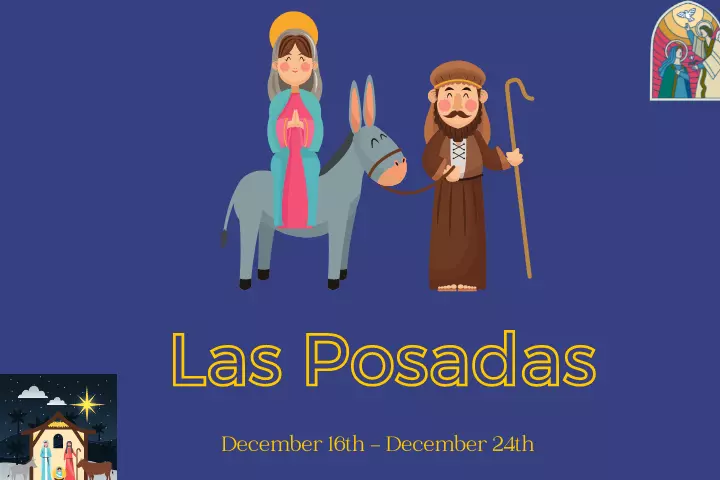
How to Celebrate Las Posadas?
There are many ways to celebrate Las Posadas. Celebrators usually make star-shaped piñatas for children and adults and reflect and meditate on different qualities for each day of the celebration. These qualities include humility, detachment, strength, trust, justice, charity, generosity, joy, and purity.
There is also a procession held on the holiday, led by someone dressed as an angel leading Mary and Joseph. Those in the parade will sing Christmas songs and go to a particular house. They sing the ‘La Canción’ Para Pedir Posada’ song when they get to the place until they are let in.
International Human Solidarity Day – December 20th
International Human Solidarity Day is not a public holiday.
International Human Solidarity Day is celebrated on December 20th and is dedicated to celebrating international unity in the United Nations and its member states. It is also called international annual unity day and is meant to celebrate unity in diversity.
What is International Human Solidarity Day?
International Human Solidarity Day is celebrated on December 20th every year and is dedicated to international unity. It is focused on celebrating unity in diversity, raising public awareness of the importance of solidarity, and reminding governments about why they should observe their commitments to international agreements.
It is also meant to encourage debates on how to promote solidarity for the gaining of Sustainable Development Goals and to encourage action for new initiatives to eradicate poverty. Governments are meant to participate in the celebration by focusing on breaking down social barriers and fighting poverty.
History of International Human Solidarity Day
The International Human Solidarity Day started on December 20th, 2005, when the United States General Assembly stated that solidarity was one of the important and universal values which should define people relations in the 21st century.
After this, the international organization regarded December 20th as International Human Solidarity Day. The purpose is to promote human and social development and eradicate poverty around the world.
How to Celebrate International Human Solidarity Day
There are different ways to celebrate International Human Solidarity Day, either on your own or with others. Most people celebrate it by learning about other cultures, creating shared experiences, visiting museums, giving international aid and raising their voices on matters of international importance.
International Human Solidarity Day also involves parades and parties, charity events, conferences on solidarity and peace, and becoming a Green Citizen. The UN also sets a theme each year for International Human Solidarity Day to mark the celebration, and organize different ways to spread awareness.
Hanukkah – December Global Holidays (18th – 26th)
Hanukkah is a Jewish festival that starts on the evening of December 18th and ends on December 26th. It is also known as the Festival of Lights and is celebrated to reaffirm the ideals of Judaism.
What is Hanukkah?
Hanukkah is a Jewish festival that celebrates and commemorates the reclaiming of Jerusalem and the rededication of the Second Temple, which happened at the beginning of the Maccabean rebellion in the 2nd century BCE against the Seleucid Empire.
It lasts for eight days from the 25th day of Kislev, which is December and is celebrated by lighting a candle on the evening of each day, making it eight candles. It can also be called Chanukah and is marked with special prayers and fried foods. Hanukkah is often mistaken with Christmas because they fall around the same time, but they are entirely different holidays.
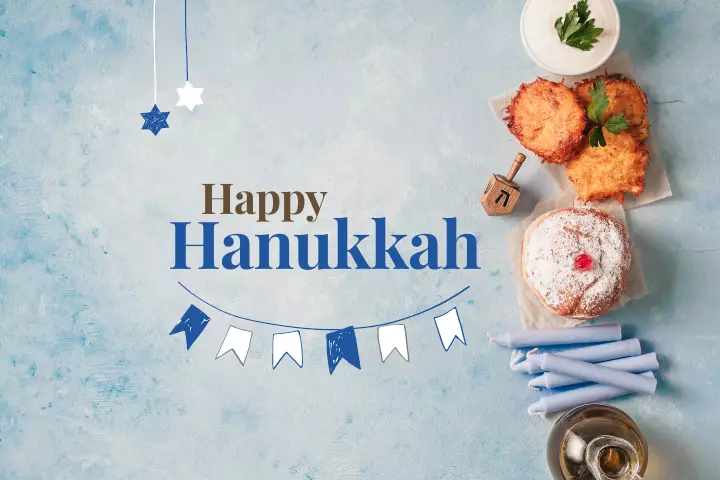
Who Celebrates Hanukkah?
The Jews celebrate Hanukkah. The best place to celebrate Hanukkah is Jerusalem, Israel, because this is the Jewish homeland. This is the most traditional place to commemorate it since Hanukkah started in Israel, and many Jews travel here during the holiday, too.
The central act of Hanukkah is the lighting of the candles each day. You need an eight-branched candelabrum for this, called a ‘hanukkiyah.’ For one hour after lighting the candle, no one is allowed to work. Instead, this time is meant to be used for family education, especially in teaching younger ones the purpose of the holiday.
There are also Hanukkah blessings given every day, and those who celebrate it make different fried foods. These include potato latkes and jelly donuts. In the United States, because it coincides with Christmas, Hanukkah is also has a gift-giving practice.
When and Why Did Hanukkah Start?
Hanukkah started in 165 BC when the Maccabean, the first Jews, were victorious over the Seleucid king and his forces and managed to take back and rededicate the temple. Hanukkah is a Hebrew verb that means ‘to dedicate’ and is a celebration of dedication.
It is said that when Maccabean entered the temple, only one small jar of oil had not been defiled. So, they lit the lamp, and the jar lasted for eight days. This set the precedent that the holiday should last for eight days to celebrate this miracle. Hanukkah is the favorite December Global Holidays for Jews.
Winter Solstice or Yule – December 21st
The winter solstice is also known as the hibernal solstice and the Longest Night occurs every year on December 21st. It happens twice a year, once in each hemisphere, when one of the Earth’s poles gets to its highest tilt farther from the sun.
The Winter Solstice or Yule is not a public holiday in any country. It is celebrated only in some parts of the world.
The winter solstice is celebrated differently in various cultures, as different societies hold different festivals and ceremonies marking what is also known as the day of the sun’s rebirth. Winter solstice honors life, death, the rising sun and moon, fire and light, and symbols.
What is the Winter Solstice?
Winter Solstice is a day in the year with the shortest period of daylight and the longest night. On either hemisphere, the sun is at its lowest elevation in the sky so that the pole will have continuous twilight on the winter solstice. The opposite day is the summer solstice.
The winter solstice occurs in the Northern Hemisphere on the 21st and 22nd of December. And in the Southern Hemisphere, it occurs in June, on the 20th and 21st of December. The winter solstice only lasts for a moment but is celebrated for the entire day. It is also seen as the middle of winter, although some calendars put it at the beginning of winter.
Winter Solstice Celebrations
The winter solstice is celebrated differently in regions around the world. Some of the solstice traditions have also influenced Christmas and Hanukkah holidays. In India, it is marked as Soyal, including purifications, gift-giving, and dancing. Then in Persia, it is the Yalda festival, in which families celebrate with nuts and stay awake all night to celebrate the rising sun.
Saint Lucia, the remembrance of the Christian martyr, is also incorporated with Norse solstice traditions like lighting fires to ward off spirits. Other places it is celebrated include Antarctica, where it is called midwinter, and Rome.
Christmas Eve – December 24th
Christmas Eve is the entire day or the evening before Christmas Day, on December 24th. Christmas Eve can be observed as a partial or full holiday depending on the region, and the practices and celebrations differ based on the area.
What is Christmas Eve?
Christmas Eve is celebrated on December 24th as the day or evening before Christmas Day. It is considered one of the most important and culturally significant celebrations in Western society.
Because the Christian liturgical day starts at sunset, Christmas Eve is seen as an important day. Originally, Christmas Eve was celebrated only the night before Christmas; as the holiday evolved, it became a full-day celebration.
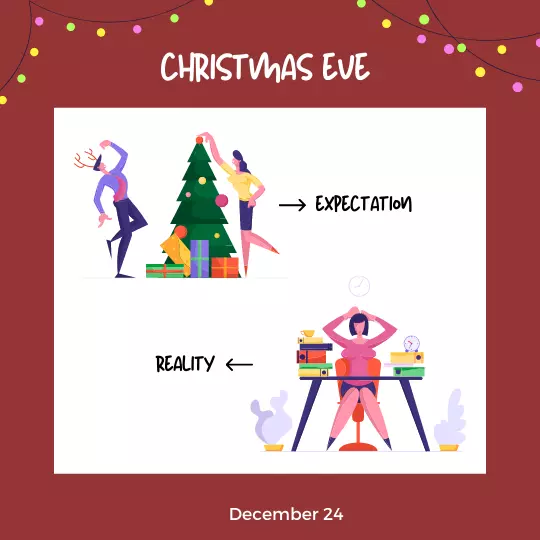
Who Celebrates Christmas Eve?
People worldwide celebrate Christmas Eve, whether they are Christians or not. Although, some religions start celebrating Christmas the day before with Christmas mass or candle lighting. It is observed in Australia, the United States, Canada, and the United Kingdom.
In the United States, people set cookies and milk out on Christmas Eve, while in Canada, they open their presents on the day. Russians fast until evening, and Spanish people hold a massive feast with their friends and family. They celebrate the Feast of the Seven Fishes in Italy while they have the le Réveillon de Noël in France.
In Mexico, they celebrate Las Posadas on Christmas Eve, while in Germany, they eat sausages and potato salads. In Denmark and Sweden, Christmas is celebrated on Christmas Eve. Then in Norway, they light a candle, and in Iceland, you are meant to give your loved one books.
Why is Christmas Eve a Celebration?
Christmas Eve became a celebration because Jesus is historically known to have been born at midnight. So, the celebration is rooted in this belief. Due to this, the holiday has become very popular since the 19th century and is an integral part of Christian culture. Christmas Eve is the favorite December Global Holidays time for families.
Christmas – December 25th
Christmas is an annual festival that is commemorated on December 25th. It is a religious and cultural celebration observed by billions of people around the world, whether they are Christian or not.

What is Christmas?
Christmas is an annual festival that remembers the birth of Jesus Christ, who is the spiritual leader of the Christians. The term means mass on Christ’s day. The Christmas holiday is an important feast of the Christian liturgical year. It comes after the Nativity Fast and season of Advent and ushers in the season of Christmastide, which is meant to last for twelve days.
In many countries, Christmas day is a public holiday, and the entire holiday season is organized around it. Thus, December is often seen as the season of Christmas. It is now associated with gift-giving, holidays, myths, and other Western traditions.
Who Celebrates Christmas?
Christmas is celebrated by Christians who believe in Jesus Christ, as their religion is based on his spiritual teachings. It is meant to mark the day he was born. Although Christians religiously celebrate it, the holiday is also culturally celebrated by non-Christians and those who have other religions worldwide.
Christmas is celebrated similarly in many places. It features a Christmas tree where gifts are placed underneath and has a substantial gift-giving culture. Christians might also go to church, but most people spend time with family and friends.
There are also practices of leaving cookies and milk for Santa the night before, decorating the tree, filling stockings up with candy and placing them over the fireplace, drinking eggnog, and kissing under the mistletoe.
When and Why Did Christmas Start?
Although Christmas is meant to commemorate the birth of Jesus Christ, it was set on December 25th by the church in Rome. This was in the 4th century during the first Christian emperor, Constantine, as a way of weakening pagan traditions.
But now, Christmas has become a worldwide commercial phenomenon, a religious holiday, and widespread cultural practice for everyone to participate in.
Boxing Day – December 26th
Boxing Day is a holiday celebrated on December 26th which is after Christmas. It occurs on the second day of Christmastide and starts as a holiday for rich people to offer presents to poor people. But now, Boxing Day is regarded as a shopping celebration, and the day you open your Christmas presents.
What is Boxing Day?
Boxing Day is celebrated on December 26th, the day after Christmas, and the second day of Christmastide. It is now a shopping holiday. When it falls on a public holiday, it can be celebrated on December 28th instead, to make sure it falls on a weekday. But in the United States, it is not a public holiday.
Saint Stephen’s Day, the Catholic holiday, is also held. This is the case for many countries in Europe.
History of Boxing Day
The name boxing day is derived from the fact that the rich used to put gifts in a box to give to the poor. It was a day off for servants, and they were given a Christmas box from their masters. They will then go home to share the Christmas boxes with their families.
The holiday originates from Great Britain and is celebrated in different countries previously part of the British Empire. In South Africa, vendors usually knock on their customers’ doors to ask for a Christmas box, which is a small cash donation. Because of the controversial practice, some places have banned people from asking for gifts.
How to Celebrate Boxing Day?
There are different Boxing Day traditions that celebrators can participate in. You can participate in sporting events like football or racing, donate time or money, plan a charity event, volunteer, etc. You can even celebrate Boxing Day the way it was traditionally meant to be commemorated by giving gifts to the poor. So, the poor people enjoy this December global holiday compared to the other festivals.
St. Stephen’s Day – December 26th
St. Stephen’s Day is also known as the Feast of Saint Stephen. According to Western Christianity, it is celebrated on December 26th and December 27th based on Eastern Christianity. Remembering the first ever Christian martyr, Saint Stephen is a Christian holiday.
What is St. Stephen’s Day?
St. Stephen’s Day is celebrated after Christmas and coincides with Boxing Day. It is meant to celebrate Saint Stephen, the first martyr or protomartyr in Christianity, who was stoned to death after the Crucifixion of Jesus Christ.
St. Stephen’s Day is also called Boxing Day, Constitution Day, or Wren Day. It is an official public holiday in Austria, Bosnia, Catalonia, Croatia, the Czech Republic, Slovakia, Slovenia, Sweden, Ukraine, Denmark, Estonia, Finland, Germany, Greece, Hungary, the Republic of Ireland, Italy, Luxembourg, North Macedonia, Poland, Norway, Romania, Serbia, Ukraine and Switzerland countries and places where Boxing Day is a public holiday.
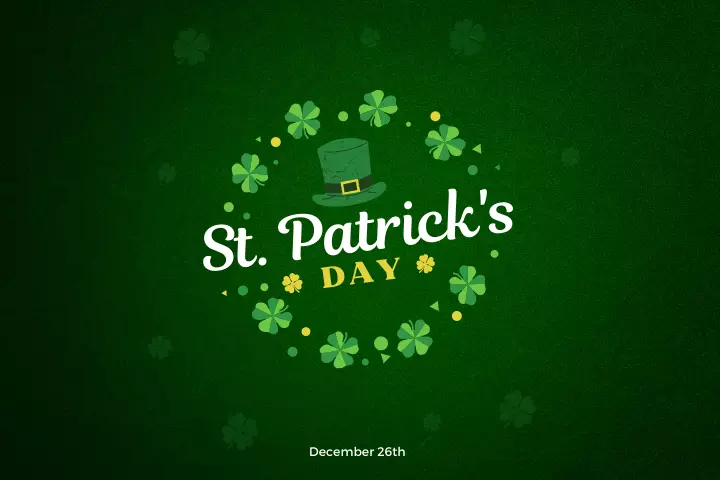
History of St. Stephen’s Day
St. Stephen was a Christian deacon in Jerusalem, and this day is meant to commemorate his life. He is known for his service to the poor and for being the first Christian to die for the cause, as he was stoned to death.
St. Stephen was stoned to death because he defended his faith before the supreme rabbinic court in Jerusalem. This made his Jewish audience angry, and he was taken outside of the city and stoned to death. His last words were a prayer for his persecutors.
In 415, a priest reported having dreamed about where Saint Stephen’s remains were. His relics were taken in procession to the Hagia Sion church on December 26th. This is why this date is St. Stephen’s Day or the Feast of St. Stephen.
How to Celebrate St. Stephen’s Day?
St. Stephen’s Day is celebrated with horse rides or sleigh horses because he is the patron saint of horses. In Ireland, people celebrate by wearing old clothes and straw hats and going from door to door with fake wrens. But, this tradition has become less common today.
In Italy, people visit Nativity scenes in the church and participate in festivals and carnivals. But in Catalonia, a large lunch is served with some leftovers from the Christmas dinner. Nowadays, you can celebrate St. Stephen’s Day by praying, giving alms, feeding birds, etc.
Kwanzaa – December 26th to January 1st
Kwanzaa is an annual celebration from December 26th to January 1st. It focuses on celebrating African-American culture and ends with a Karamu, a communal feast. Kwanzaa is meant to celebrate African heritage, culture, and unity and is observed by African Americans and Africans in the diaspora. Kwanzaa itself is not a public holiday, but offices, schools and businesses will be closed because it falls on the same date as the Christmas holidays.
What is Kwanzaa?
Kwanzaa is an annual holiday celebrating African-American social and family values, mainly in the United States. It is a time of self-affirmation in the African community which celebrates Black heroes and heroines.
The name, Kwanzaa, means ‘first fruits’ in Swahili. It was derived from the phrase, ‘matunda ya kwanza.’ But, the word has two a’s because, in the first Kwanzaa celebration in 1966, children wanted to represent a letter, but there were seven of them.
Kwanzaa is a secular holiday, and although often seen as an alternative to Christmas, those from different faiths and traditions can celebrate it. Non-Black people can also celebrate it.
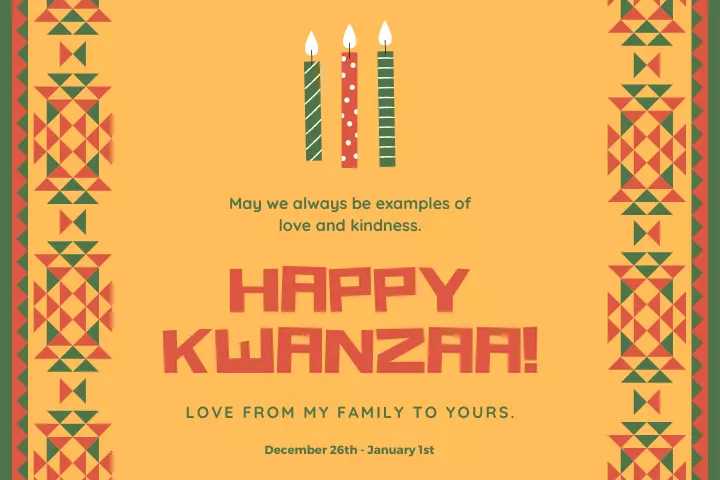
History of Kwanzaa
Kwanzaa was founded by Dr. Maulana Karenga, a scholar, educator and activist, in 1966. It was first celebrated as an African-American holiday with its roots in African traditions. The holiday is based on the Pan African philosophy, which honors culture, values, family, nature, community, and history.
In the United States of America, Kwanzaa celebrates African and African-American culture. It gives thanks to those who survived the Middle Passage and the progress in the future. The holiday celebrates Africans through poetry, music, dance, spoken word, storytelling, and drumming.
How to Celebrate Kwanzaa?
Kwanzaa has different symbols: corn, mats, crops, candleholder, a unity cup, gifts, and seven candles. Among the seven candles, three are green to represent African land and future, three are red to show the struggle, and one is black to portray African people. These are also the celebration’s colors, so celebrators decorate their homes and clothes with these colors.
There are different ways to celebrate Kwanzaa. Some of the traditions include honoring ancestors, preparing and sharing food, lighting candles, reflecting on the principle of African education, and sharing talents.
New Year’s Eve – December 31st
New Year’s Eve is the evening or entire day of the last day before the new year. December 31st is the last day of the year and is based on the Gregorian calendar. It is also known as Saint Sylvester’s Day and Old Year’s Day. New Year ends when the clock strikes midnight, and there is a new year.
New Year’s Eve, as well as New Year’s Day, are public holidays in the USA, UK, European countries and North America. But, New Year’s Eve and New Year’s Day is not public holiday in many Asian countries like India.
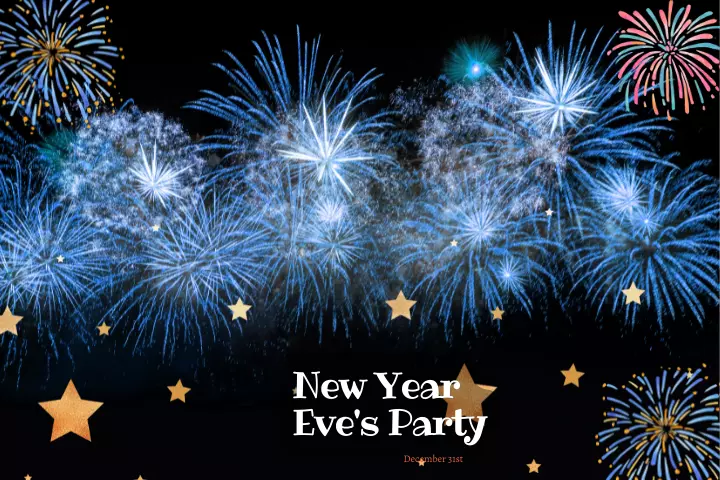
What is New Year’s Eve?
New Year’s Eve is the last day of the year on the Western calendar and is usually marked with a celebration. New Year’s Eve is when you reflect on the year, as many things might have changed over the past 365 days. So, it is meant to mark the good things that happened in the year and the beginning of a new year.
New Year’s Eve is celebrated the same way most of the time. Christians also celebrate it with a watch-night service, and the celebration continuously extends to January 1st, which is for New Year’s. Tonga and the Line Islands are the first places to enter a new year.
New Year’s Eve History
New Year’s Eve celebrations are traced back to festivals in Europe, even before the spread of Christianity. But, when many people converted to Christianity, the New Year’s Eve celebration became even more relevant and related to Christian beliefs.
But, the earliest celebrations of New Year’s Eve date back to 4000 years ago in ancient Babylon. There were also New Year’s Eve celebrations in China and Egypt.
How to Celebrate New Year’s Eve?
There is no set way of celebrating New Year’s Eve. In the West, the celebrations are done by eating, watching, dancing, drinking, and lighting fireworks. Families can enjoy this holiday by having a dance party, playing video games and board games, cooking snacks and cocktails, and formal events.
You can also join in parades and carnivals, charity events, etc. New Year’s Eve is a widely celebrated December Global Holiday.